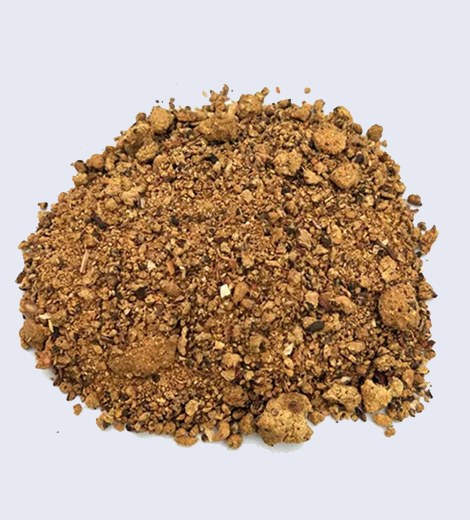
Cotton Seed Meal
Cotton Seed Meal is a byproduct of the cottonseed oil extraction process. It is commonly used in various applications, primarily as a source of protein and other nutrients for animal nutrition and as a soil amendment in agriculture.
Cottonseed meal is produced during the extraction of oil from cottonseeds. The oil is commonly used for cooking, industrial applications, and as an ingredient in various products.
After the oil is extracted from the cottonseeds, the remaining material is processed and dried to create cottonseed meal.
Animal Feed: Cottonseed meal is primarily used as an ingredient in animal feed, especially for livestock, poultry, and aquaculture.
Livestock and Poultry: It is used in diets for cattle, swine, poultry, and other farm animals as a source of protein and essential nutrients.
Ruminants: Cottonseed meal is often used in ruminant diets (cattle, sheep, goats) and can be a source of bypass protein, which is protein that escapes microbial degradation in the rumen and is available for absorption in the small intestine.
Aquaculture: It is used in fish and shrimp feeds to provide essential nutrients and promote growth.
Soil Amendment: In agriculture, cottonseed meal can be used as an organic soil amendment and fertilizer due to its nutrient content. It provides nitrogen, phosphorus, and potassium to the soil, improving soil fertility.
Protein and Nutrients: Cottonseed meal is valued for its protein content and nutrient composition, making it a cost-effective source of nutrition for livestock and poultry.
Sustainability: Utilizing cottonseed meal in animal feed helps reduce food waste by making use of the byproduct of the cottonseed oil extraction process.
Soil Improvement: When used as a soil amendment, cottonseed meal can improve soil structure and fertility, promoting healthy plant growth.
Protein: Cottonseed meal is a valuable source of protein, typically containing around 40% to 50% protein content. It provides essential amino acids.
Fiber: It also contains dietary fiber, which can be beneficial for animal digestion.
Minerals: Cottonseed meal is a good source of minerals, including phosphorus and potassium, and it contains moderate levels of calcium.
Fat Content: While it is a byproduct of oil extraction, cottonseed meal still contains some residual fat, but the levels are lower compared to whole cottonseeds or cottonseed oil.
Quality Control: The quality of cottonseed meal can vary based on factors such as the source materials and processing methods. Quality control is essential to ensure safety and nutritional consistency.
Gossypol Content: Cottonseed meal contains gossypol, a natural compound that can be toxic to some animals, especially monogastric animals like pigs and poultry. Low-gossypol cottonseed meal is preferred for these species.
Regulations: The use of cottonseed meal in animal feed and agriculture is subject to regulations and guidelines in many countries to ensure safety and quality.
Cotton Seed Meal is a protein-rich and nutrient-rich byproduct of the cottonseed oil extraction process, commonly used in animal nutrition, including livestock, poultry, and aquaculture. It is also used as a soil amendment to improve soil fertility in agriculture. Proper sourcing and quality control are crucial to ensure its safety and nutritional value.
